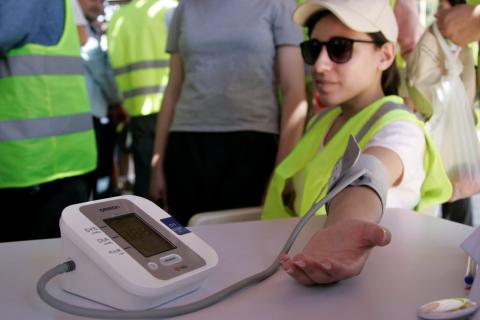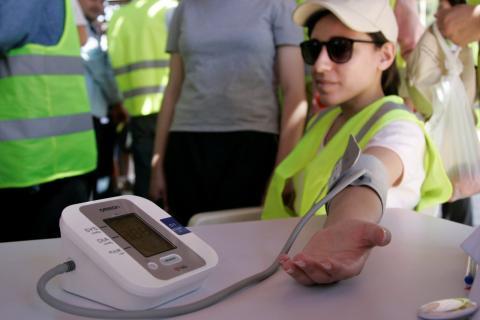
Among the many benefits that have been associated with fasting is a lower blood pressure, but experts are still confused about the reasons behind this effect.
Dr. Rami Al-Jafar, from Imperial College London, attributes this lower blood pressure to metabolic changes, while an Egyptian expert cited three other reasons.
Two years ago, Dr. Rami Al-Jafar led a study that was published in the American Heart Association journal (AHA), on how fasting helps achieving a temporary lower blood pressure but without highlighting the reasons.
During the study, researchers analyzed 85 people fasting during Ramadan between the ages of 29 and 61 from five mosques in London. Scientists measured their systolic (the top number) and diastolic (the bottom number) blood pressure before and after Ramadan.
Participants were also asked to keep food diaries for three days before and during Ramadan.
The study found an average reduction of 7.29 mm Hg in systolic blood pressure and 3.42 mm Hg in diastolic blood pressure in the days after Ramadan.
The results were correct among the healthy participants, and those suffering from high blood pressure and diabetes.
In an article published on the AHA website, Dr. Jafar speculated that “the reductions in blood pressure result from a metabolic change.”
“After eight to 12 hours of fasting, the body begins burning ketones rather than glycogen, which can help lower the blood pressure,” he explained. Ketones are a type of chemical that your liver produces as an alternative source of energy, while Glycogen is a branched polymer in which glucose is the main building block, and serves as an energy storage.
Many experts agree with Al-Jafar on the significant role of the metabolic change in lowering blood pressure, suggesting that other reasons might affect too.
Sameh Abdulalim, internal medicine expert at the Egyptian health ministry, said “limiting calories while fasting is associated with lower blood pressure. Fasting is often linked to consuming less calories, which could help explain some its effects.”
“Among the other suggested reasons are the relaxation of the digestive system due to fasting, unlike its always-active state on regular days,” he told Asharq Al-Awsat.
“Fasting also affects blood pressure through the gut microbiome, a set of bacteria that live in the digestive track, and affect digestion and the immune system,” he concluded.











